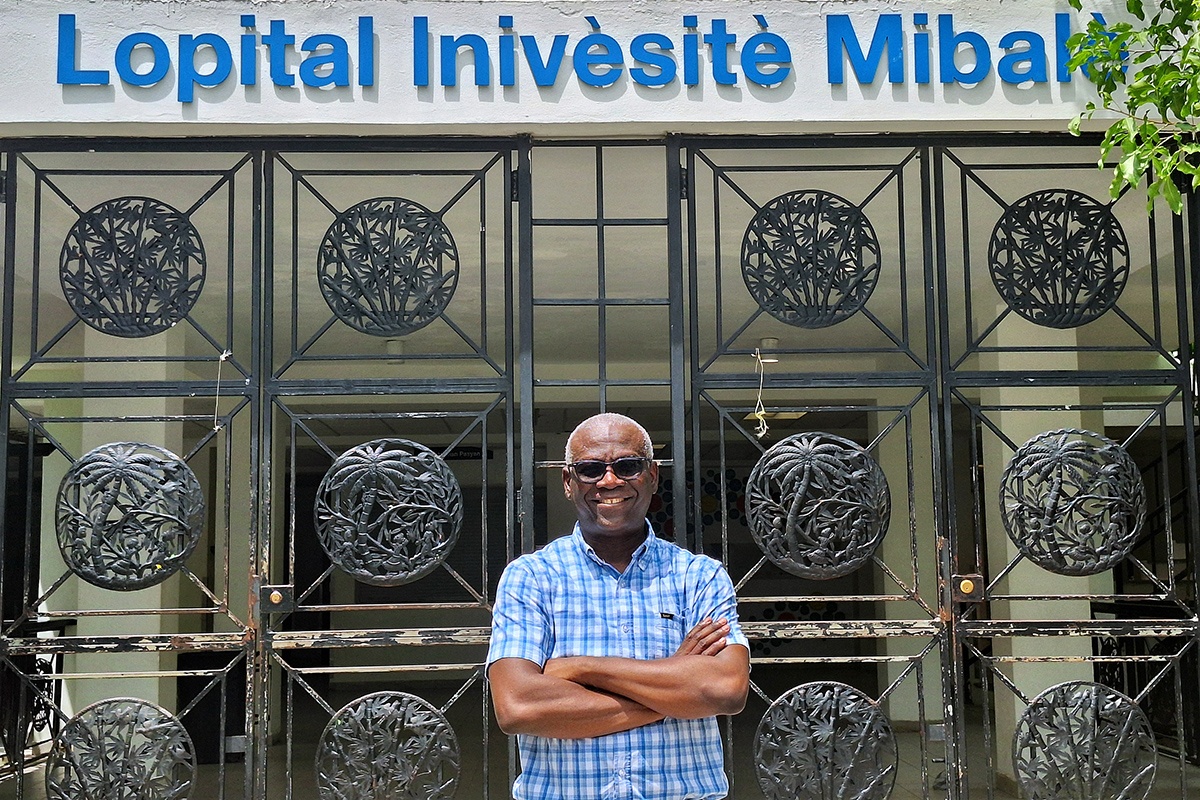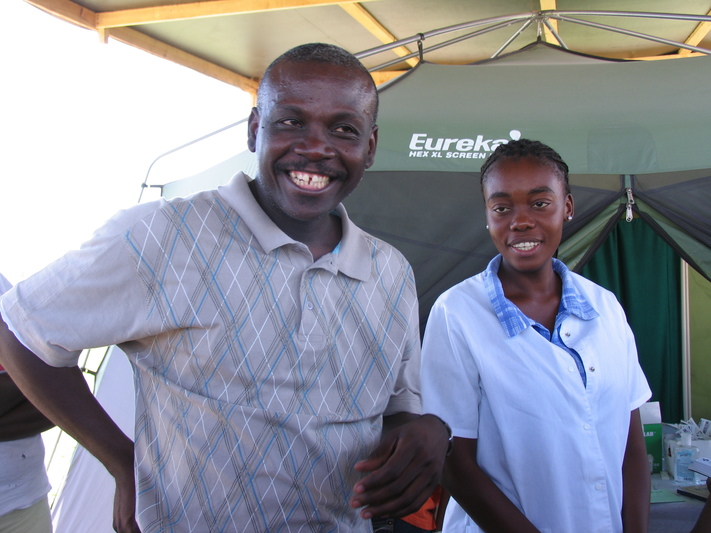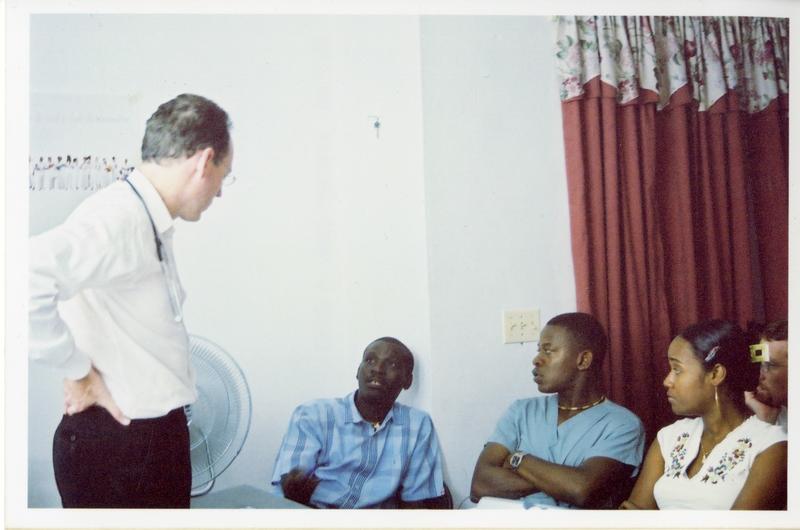From Medical Intern to Executive Director in Haiti: Meet Dr. Wesler Lambert
After joining Zamni Lasante following medical school 27 years ago, Lambert is using his deep experience as the new interim executive director in Haiti
Posted on Jun 10, 2024

When Dr. Wesler Lambert began as an intern in one of Partners In Health’s first clinics in Haiti in 1997, he couldn’t have imagined the organization would grow to be the country’s largest health care provider outside of the government—and that it would eventually be under his leadership. Among the first people hired to join the team, he brings a wealth of knowledge and experience to his new position as interim executive director of Zanmi Lasante (ZL), as PIH is known in Haiti.
Lambert was first introduced to PIH when he was signing up for his year of social service—a national requirement for physicians in Haiti to complete after their six years of medical school. As luck would have it, a soccer teammate’s intervention brought Lambert to Cange, a remote village in Haiti’s Central Plateau, where Zanmi Lasante began.
“The health regional director [of the MOH] was a friend. We used to play soccer together,” Lambert remembered about Dr. Paul Adrien, “I was supposed to go to Boucan-Carré, but he told me it was just two rooms in a small clinic, and he didn’t think I would learn anything there. He asked if I had heard about Cange and Paul Farmer, but it was completely new to me. He asked me to move to Cange and I became the first social service intern there.”
Back then, Cange was a two-ward hospital—one for adults and one for children. For Lambert, this was a new experience. He came from the capital city, Port-au-Prince, where he worked as an intern in the General Hospital—at one point, the largest and most impressive medical facility in the nation. Still, he was seeing patients who couldn’t afford the medication he was prescribing, so they often left the outpatient clinic empty-handed—and with no follow-up or support to ensure they were receiving proper care. When he came to Cange, under the leadership of PIH Co-founder Dr. Paul Farmer and his Haitian colleagues, he noticed a difference in how services were provided.
“This was a unique opportunity for me to see how being a doctor can be,” Lambert said. “At the General Hospital, you meet a patient, and you don’t really care what happens after. But having met Paul [and other Haitian doctors], and seeing the way they treat patients, it was a completely new experience for me.”
Twenty-Seven Years of Experience
After his start as an intern, Lambert began to work his way through different departments at Zanmi Lasante. Despite being a generalist, he was assigned to the pediatric ward in Cange after the pediatrician there left. Farmer placed him in the role, knowing he didn’t have the formal training, but having confidence in his ability to provide quality pediatric care all the same.
Lambert continued his journey at Zanmi Lasante in the ‘90s as a physician and worked on the first study on the dynamics of sexually transmitted diseases in rural Haiti before traveling to Boston University (BU) in 2001 to start a master's program in public health. Before he could complete his studies, however, Farmer called him back to Haiti to support the extension of Zanmi Lasante’s HIV program in the Central Plateau.
In 2002, he became the medical director of Lascahobas, Zanmi Lasante’s first scale-up site for HIV care. Then, he became a sub-regional director—Unité Communal de Santé—for the Ministry of Health.
Eventually, he returned to the United States to finish his studies, receiving his master's degree in public health at BU in 2006. He then returned to Haiti to help Zanmi Lasante improve the ZL training program and support a maternal and child health project.
In 2007, PIH leadership asked Lambert to go to Rwanda—a fairly new site at the time—to help the team with the introduction and integration of their HIV program and to help train staff. Meanwhile, Farmer recognized the many skills of his friend and colleague and asked Lambert for his support with monitoring and evaluation in Haiti. To satisfy both requests, he began spending three months in Rwanda and nine months in Haiti for three years.
Haiti’s devastating 2010 earthquake changed everyone’s plans. All major hospitals and teaching facilities had been either destroyed or severely damaged, alongside other government institutions and thousands of families’ homes. It became clear that Zanmi Lasante needed everyone’s assistance to provide emergency response, care, and support to those living in temporary camps established across the capital. Lambert returned to the country full-time to help lead the organization’s response in Port-au-Prince.

As a new normal descended in the following years, while also serving as the deputy executive director of Zanmi Lasante, Lambert became the technical lead for a large national grant—Service de Santé de Qualité pour Haiti—for Partners In Health and Zanmi Lasante. The grant was funded by U.S. Agency for International Development and led by Pathfinder International.
In 2017, Lambert switched away from his deputy role to begin overseeing the strategic information department, which included information technology, medical informatics, research, training, and monitoring and evaluation.
Three years ago, Lambert was asked to return to his role as deputy executive director, as Marc Julmisse, now PIH’s chief of clinical systems support, stepped in as the interim executive director of Zanmi Lasante.
In January, decades after joining the organization as one of its first interns, Lambert assumed his role as interim executive director of Zanmi Lasante. The significance of this moment isn’t lost on him.
“In any position, you can affect change,” Lambert said. “But in my new position as executive director, it reminds me that I don’t have any excuse. I have to deliver.”
Becoming a Doctor
Before his journey with Partners In Health began, Lambert knew he wanted to work in health care. When applying to university, Lambert applied exclusively to medical school. There were only 100 seats for around 2,000 applicants, but he was confident he would earn one of them.
"I always wanted to be a doctor,” Lambert said. “I learned from my mother that you always have something to give someone. I learned along the way that when a patient comes to you, even in the most desperate situation, you have to bring some hope. Being a doctor, you have this special connection with life and people. It’s quite special.”
After graduating from medical school and interning with Zanmi Lasante, he favored working in an environment that was helping the community in his home country and wanted to continue his work with PIH.
“The most attractive part of this work is serving,” Lambert said. “My biggest lesson from Paul is humility. It’s how you become great in serving the poorest.”

Leading Through Uncertainty
Lambert is no stranger to the instability of Haiti, having grown up in the country and experiencing it firsthand when he was kidnapped on his way to work in 2004. Luckily, he was left unharmed, although without his wallet. But the experience left him rattled and with deep knowledge of what it feels like to be at another person’s mercy in a time of uncertainty.
The more recent escalation of gang activities has affected his day-to-day life significantly.
“The violence and instability have been very difficult and have impacted my approach to work,” Lambert shared. “I like to stay close to the team, do field visits, and visit with partners, but, unfortunately, this situation has pushed me to spend most of my time away from our teams because of the security risk. When I have a meeting that I need to attend, I have security in an armored vehicle, which is something I never imagined in my life.”
Despite the safety concerns, Lambert and his team at Zanmi Lasante have kept striving to provide the best care possible for patients.
“To see the team risking their lives to keep our services running, gives me the motivation to be like them,” Lambert said. “We have our various strategies and strong connections with the community that have been helping us. People want peace, and deserve peace, and they are very committed to stay and serve the country. We see this at Zanmi Lasante, even with our residents.”
A Man with a Plan
Lambert is clear about the direction he hopes to take Zanmi Lasante. As he looks to the future, he has three major goals for his team.
“I want to make Zanmi Lasante sustainable,” Lambert said. “We need to have stronger systems to sustain our work. Our work is so incredible, and it’s saving so many people’s lives, so we have to make sure we keep it going. I want to improve our quality of care and services because we’ve been extending so much, and I don’t want it to affect the quality. Also, I want to create and maintain a more supportive work environment that attracts and helps us retain talented people.”
His talented colleagues and the incredible Zanmi Lasante community are part of what motivates Lambert during his long days, many of which end with answering emails until 11 p.m.
“I see opportunities to make significant changes at ZL,” Lambert said. “For me, that’s the most motivating part of my work. We can make lasting change. We have a wonderful, dedicated, skilled core team that makes my life easier, they make the work easier. They are playing a huge part in my motivation.”

